Learn NCERT Class 4 English Santoor Chapter 9 Hekko, Hekko Questions and Answers, from this page for free of cost. We have compiled the NCERT Class 4 English Book Solutions for all topics in a comprehensive way to support students who are preparing effectively for the exam. You will discover both numerical and descriptive answers for all Lesson 8 NCERT Class 4 English Santoor Chapter 9 Hekko, concepts in this NCERT English Solutions pdf. Make use of this perfect guide and score good marks in the exam along with strong subject knowledge.
You can get answers of Hekko class 4 questions and answers, NCERT Class 4 English Santoor Chapter 9 Hekko class 4 pdf, NCERT Class 4 English Santoor Chapter 9 Hekko questions and answers, NCERT Class 4 English Santoor Chapter 9 Hekko 4 lesson plan, 4 NCERT Class 4 English Santoor Chapter 9 Hekko class 4 summary, So explore this page.
Queries – NCERT Class 4 English Santoor Chapter 9 Hekko Solution, NCERT Class 4 English Santoor Chapter 9 Hekko, class 4 question answer, Santoor ncert book class 4 chapter 9, NCERT Class 4 English Santoor Chapter 9 NCERT Class 4 English Santoor Chapter 9 Hekko Question Answers
Hekko – NCERT Class 4 English Santoor Chapter 9 (New Book)
Hekko – NCERT Class 4 English Santoor Chapter 9 (New Book) (Page 73)
Chapter 9. Hekko
NCERT Class 4 English Santoor Chapter 9 Hekko Question Answers
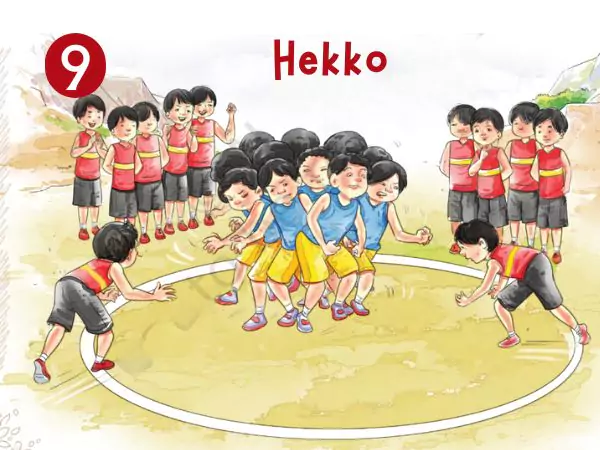
Chapter Summary: Hekko
The word ‘Hekko’ comes from two words: ‘Hek’ meaning challenge and ‘Ko’ meaning tiger. The chapter is based on a folk story from Nagaland involving Aami (the man) and Aakho (the tiger). It describes how humans and animals once lived together and had a disagreement over who was superior. This led to a challenge known as Hekko.
Today, Hekko is a traditional team game played in the Mokokchung district of Nagaland. The game reflects strength, strategy, and teamwork. There are two teams: Aami and Aakho, each with 11 players. The game is played in a circle, and each team has specific roles—Aami stays inside forming a human chain, while Aakho attacks from outside.
Points are scored when a player is pushed out or caught. The game ends in one of three ways:
- All Aakho members are caught.
- All Aami players are pushed out.
- The time runs out.
The strongest player of Aakho is called “Khotiba” and the fastest player of Aami is titled “Khozuba”.
Textual Exercise
Hekko– NCERT Class 4 English Santoor Chapter 9 (New Book) (Page 93)
Comprehension Questions
A. Answer the following.
On the basis of your understanding the text, answer the following.
1. What does the word ‘Hekko’ mean?
Answer : ‘Hekko’ means “Challenging the Tiger.”
2 What are the two teams in the game called?
Answer : The two teams are called Aami and Aakho.
3. How many players are there in each team?
Answer : Each team has 11 players.
4. What do the players in the Aami team do inside the circle?
Answer : They form a human chain and try to stay inside the circle while defending against the Aakho team
5. Why do you think the Aakho team (Tiger) must say “Joko” when they are caught?
Answer : Saying “Joko” means surrender, showing that they accept defeat and are out of the game.
B. Think and discuss.
On the basis of your understanding the text, answer the following.
1. If you were playing the game Hekko, would you prefer to be in the Aami or Aakho team? Why?
Answer : I would prefer to be in the Aami team because I enjoy teamwork and defending in a group. It would be fun to form a human chain and protect the circle.
2. If you could add a new rule to the game, what would it be? What would be the benefit of the new rule?
Answer : I would add a bonus round where both teams switch roles. This would make the game more exciting and fair.
Let us Learn
A. Choose the correct option to complete the sentence.
1. their/there
……………….. (their/there) is a beautiful park in my neighbourhood.
They completed ………………….. (there/their) work very fast.
Answer:
There is a beautiful park in my neighbourhood.
They completed their work very fast.
2. two/too
………. of my friends participated in the poster-making competition.
I was ………………. tired after playing.
Answer:
Two of my friends participated in the poster-making competition.
I was too tired after playing.
3. through/threw
The bowler ……………. the ball towards the batsman.
I can see the clouds …………… my window pane.
Answer:
The bowler threw the ball towards the batsman.
I can see the clouds through my window pane.
4. caught/cot
My mother …………………… me eating an icecream at night.
I sleep on a ………… when I am at my grandmother’s village.
Answer:
My mother caught me eating an ice cream at night.
I sleep on a cot when I am at my grandmother’s village.
right/write
While crossing the road, look to your then left, then right again and then cross the road.
in a neat and legible handwriting.
Answer:
While crossing the road, look to your right, then left, then right again and then cross the road.
Write in a neat and legible handwriting.
B. Look at the pictures and write their names. One has been done for you.
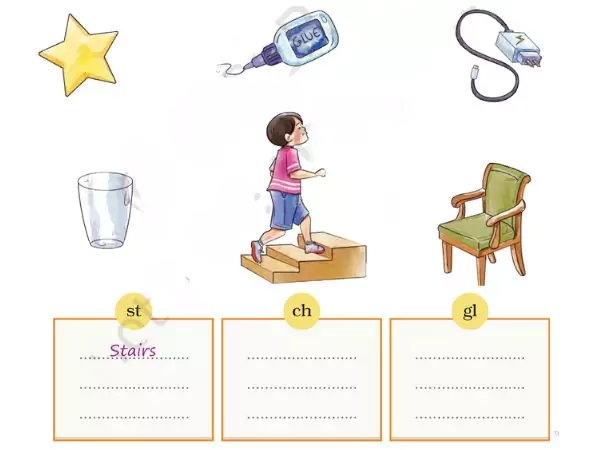
Answers :
| st | ch | gl |
| Stairs | Charger | Glass |
| Stars | Chair | Glue |
C. Match the animals with their sound.
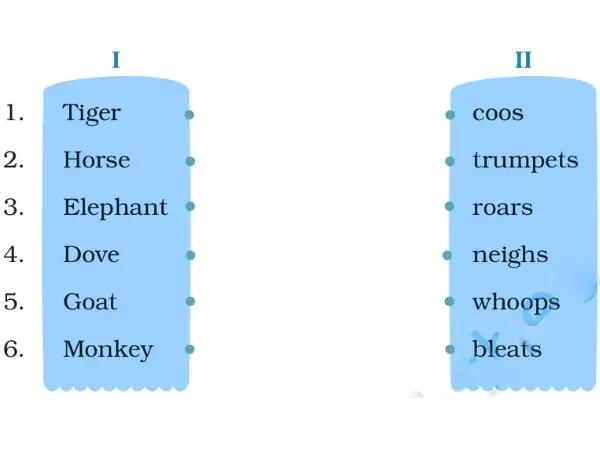
Answers :
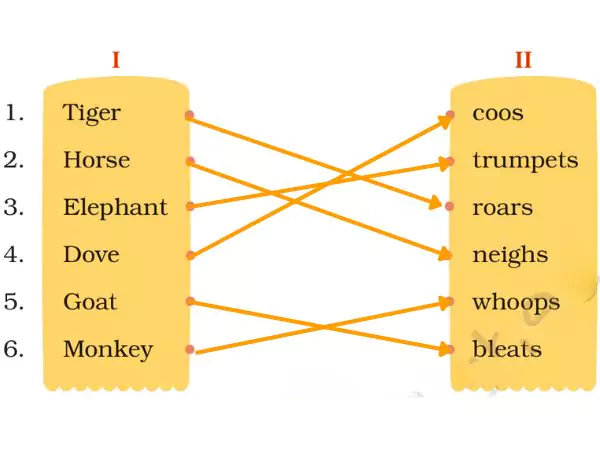
Let Us Think
A. Observe how the children are described in the poem, like ‘Active Boy Anant’, ‘Graceful girl Geeta’ etc. Write one quality that starts with the same letter as your name.
A. Answer the following:
B. Think and discuss:
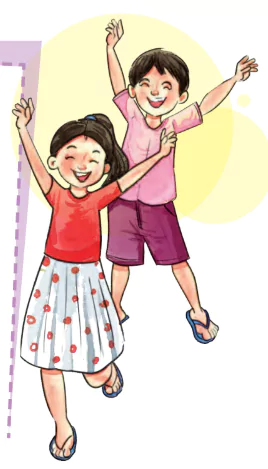
1. Ravi came running with sweat dripping down his face.
2. Deepa is the captain of Sundarpur Tigers.
3. The Lagori match reminded everyone of the simple joys of teamwork and play.
E. Number the sentences in order as per the events given in the story.
1. The Sundarpur villagers lifted the hands of both the captains and everyone celebrated.
2. The Green Warriors took the ball and aimed to hit the Tigers.
3. Nidhi threw the ball with precision, and the stones scattered.
4. Cheers erupted from the Tigers’ side.
5. All the players from both the team shook hands and appreciated each other for a good game.
6. The referee blew the whistle and Nidhi took the first shot.
7. The Sundarpur Tigers began to rebuild the stack of stones.
Answer : Correct order:
6 → 3 → 2 → 7 → 4 → 5 → 1
Let us Learn
A. Circle the word that does not have the same meaning as the word in bold.
1. Together, the students built a large sand castle during recess.
Let us Listen
Your teacher will read out short sentences for you. Each sentence has one word in it which is different from the rest. Write down the word that does not fit in each sentence.
1. I’m learning the rules of different sports like football, basketball, reading, running and swimming.
Answer : reading
2. After school in the playground, we play Gilli Danda, hide and seek, Satoliya, swimming, hopscotch, skipping and hockey.
Answer : swimming
3. My brother likes to play Kabbadi, basketball, badminton, kho-kho, knitting and Lagori.
Answer : knitting
4. In the sports class, we get training for climbing, sprinting, jumping, stretching and writing.
Answer : writing.
5. We use a ball while playing cricket, hockey, skipping, tennis and volleyball.
Answer : skipping
Let us Speak
A. Speak to your playmates and find out who.
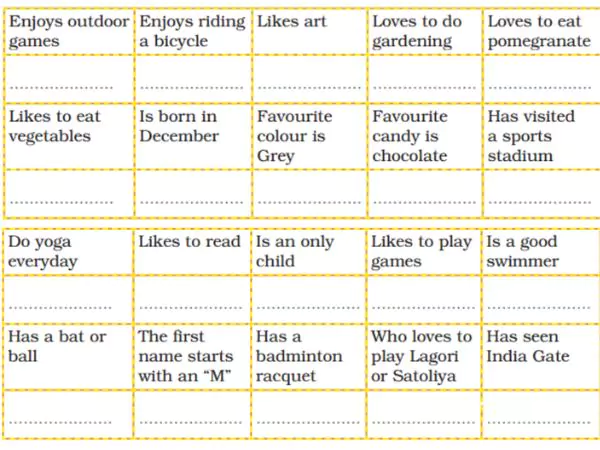
D. Read the following sentences. Notice the underlined words.
Once upon a time, humans and animals lived together. Aakho declared that the tigers had
the first right on all the things. The humans challenged Aakho.
• The underlined words tell us that the events happened some time ago or in the past.
• In past simple tense, you can add -ed to verbs to get this form.
There are many verbs to which we don’t add -ed.
For example; came, drank, drove, saw, etc. Such
verbs are called irregular verbs.
E. Fill in the blanks using -ed.
Last week, we ……………………. (visit) the park for a
while. There were many children in the park.
They were playing different games. My mother
…………………….
(point) at the children playing
kabbadi. On our way home, my sister …………………….
(jump) in a puddle and muddied everyone’s clothes.
I ……………………. (enjoy) my visit to the park.
My sister ……………………. (want) to go to the pond
but I ……………………. (decide) to stay and watch the
game of kabbadi. I ……………………. (watch) the game
for a while and then ……………………. (join) my mother
and sister. There were many fishes in the pond.
I
……………………. (spot) a goldfish and my sister
……………………. (notice) two tadpoles in the pond.
Answer:
Last week, we visited the park for a while. There were many children in the park. They were playing different games. My mother pointed at the children playing kabbadi. On our way home, my sister jumped in a puddle and muddied everyone’s clothes. I enjoyed my visit to the park.
My sister wanted to go to the pond but I decided to stay and watch the game of kabbadi. I watched the game for a while and then joined my mother and sister. There were many fishes in the pond. I spotted a goldfish and my sister noticed two tadpoles in the pond.
Let us Listen
Listen to the description of some traditional games of India. Identify each game and write its name in the space given below.
In this game, we stack seven stones on top of each other. The first team throws a ball to nock them down. After the stones are knocked down, the members of the first team urriedly rearrange the stack while the opponent team catches the ball to quickly hit the members of the first team before the stones are restacked. If you are hit by the ball, you are out. Can you guess the name of the game.

Answer: Seven Stones or Satoliya/Pittu/Lagori
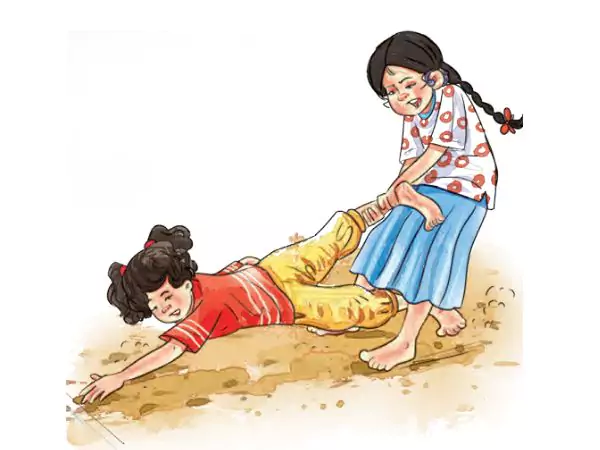
In this game, there are two teams. One
player from the first team crosses into
the second team’s side while chanting
the name of the game continuously
without taking a breath! The goal is to
tag as many players as possible and
return to their side before being caught.
If the player is caught, the other team
scores. Can you guess the name of this
game?
Answer : Kabaddi
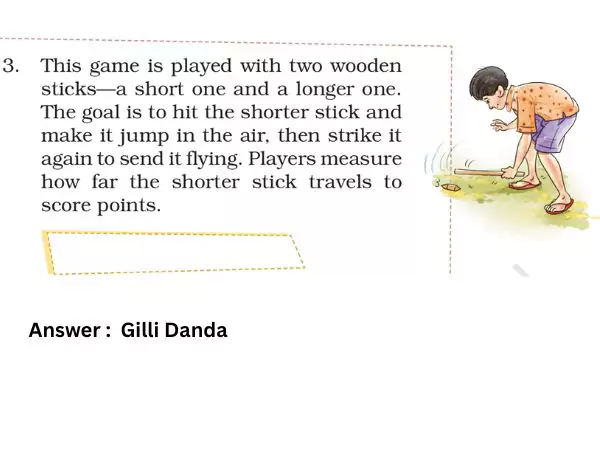
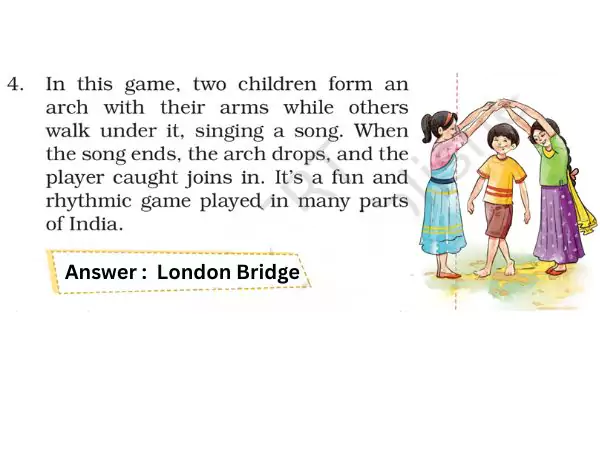
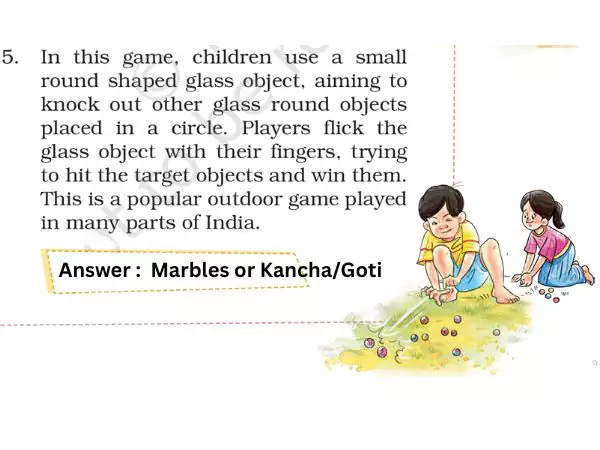
Let us Speak
A. Look at the pictures and identify the games being played.
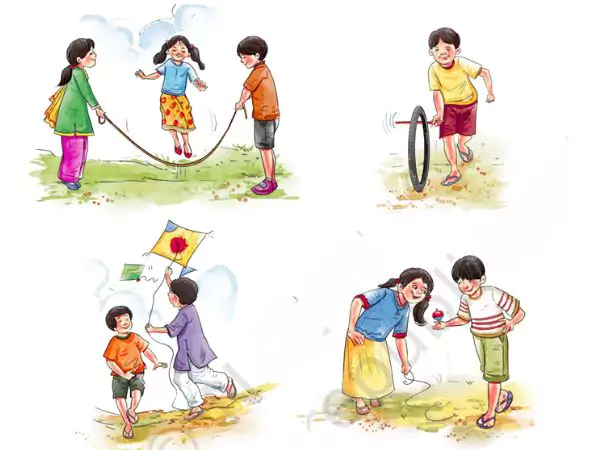
• Have you played any of these games before?
Answer :
Yes, I have played rope skipping and with my friends in the playground during recess.
• Discuss with your partner about the games you recognise.
Answer:
I recognise rope skipping-where two players hold the each end of the rope and one player tries to jump over the moving rope as many times as possible, until he or she touches the rope. This game is good for health; it makes our heart strong and strengthens our breadth.
• Which one is your favourite? Why do you enjoy playing it
Answer : My favourite game is Seven Stones (Lagori) because it’s fast-paced, fun, and involves teamwork. I enjoy the excitement of trying to restack the stones before getting hit by the ball. It’s a mix of skill, speed, and strategy!
Let us Write
A. You read how the people of Nagaland made the
game of Hekko. Use the space given below to write
about a new game that you would like to play.
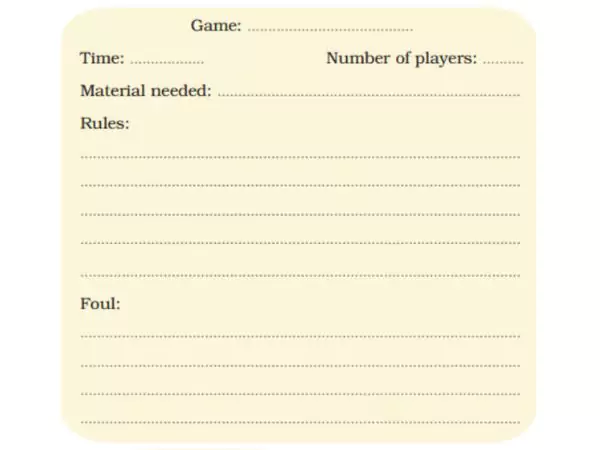
Answer :
A. My New Game – Sample Response:
- Game Name: Shadow Tag
- Time: 30 minutes
- Players: 6–10
- Materials Needed: Open ground, sunshine
- Rules:
- One player is “It”.
- They must step on someone’s shadow to tag them.
- Once tagged, the next person becomes “It”.
- Foul:
- Stepping out of bounds.
- No pushing or rough play.
Let us Explore
Nagaland is a land of festivals. Hornbill is one of the
festivals to promote the culture of the state. Find out
more about it.
Answer :
The Hornbill Festival is celebrated in December in Nagaland. It showcases Naga culture, folk songs, traditional sports, and crafts. It is known as the “Festival of Festivals” and attracts tourists from around the world.
Hope you’ve got all the question answers in this page and find this NCERT Class 4 English Santoor Chapter 9 Hekko question Answers useful for exam preparation. Please share with others who need this.
Related Searches
- Chapter 1. Together We Can
- Chapter 2. The Tinkling Bells
- Chapter 3. Be Smart, Be Safe
- Chapter 4. One Thing at a Time
- Chapter 5. The Old Stag
- Chapter 6. Braille
- Chapter 7. Fit Body, Fit Mind, Fit Nation
- Chapter 8. The Lagori Champions
- Chapter 9. Hekko
- Chapter 10. The Swing
- Chapter 11. A Journey to the Magical Mountains
- Chapter 12. Maheshwar
- NCERT CLASS 4 SANTOOR QUESTION ANSWERS